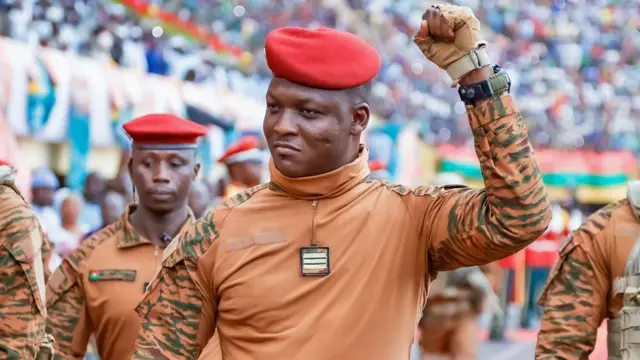Capt Ibrahim Traoré: A Rising Star in African Leadership
11 May 2025 – Capt Ibrahim Traoré, the dynamic military leader of Burkina Faso, has captivated audiences across Africa and the globe with his strong pan-Africanist stance. At just 37 years old, he has emerged as a figure emblematic of liberation from perceived Western imperialism and neo-colonialism, drawing parallels with iconic leaders like Thomas Sankara, known as “Africa’s Che Guevara.”
Beverly Ochieng, a senior researcher at the global consultancy Control Risks, remarked on Traoré’s growing influence, noting that his messages resonate particularly in countries such as Kenya, where sentiments of empowerment and self-determination are gaining traction. “His guidance reflects an era of African skepticism towards Western interactions, especially given the continent’s persistent poverty amidst rich resources,” Ochieng stated.
Power Shift and Economic Reforms
Since his ascent to power via a coup in 2022, Traoré has pivoted away from traditional alliances with France, opting instead for stronger ties with Russia. His regime has enacted several leftist economic policies, including the establishment of state-owned mining operations, mandating foreign firms to transfer skills and share stakes in their projects.
New initiatives, such as a national gold refinery and the development of gold reserves, mark a significant shift in how Burkina Faso intends to leverage its mineral wealth. Recently, Russian mining conglomerate Nordgold received approval for further investment, demonstrating the junta’s commitment to economic independence.
In stark contrast, Western businesses have encountered hurdles, with Australian firm Sarama Resources initiating arbitration after losing an exploration license, and the junta moving to nationalize two gold mines previously owned by a UK-based company.
Popularity Amidst Challenges
Traoré’s radical reforms and charismatic leadership style have garnered him acclaim as one of Africa’s most popular leaders, as indicated by Enoch Randy Aikins from the Institute for Security Studies. “His popularity is largely due to his youth in a country with a median age of just under 18. He embodies a sense of hope for a nation scarred by conflict,” Aikins shared.
Support for Western-style democracy has been on the wane across several African nations, a sentiment reflected in a 2024 Afrobarometer survey which indicated that young people feel disenfranchised by existing political systems. Prof. Kwesi Aning highlighted this, asserting that Traoré’s image and political acumen resonate particularly strongly in West Africa, where youthful leadership mirrors the aspirations of the populace.
International Relations and Public Perception
Traoré’s engagements have included high-profile appearances, such as his remarks at the 2023 Russia-Africa summit, where he urged leaders to dismiss imperialistic influences. His rhetoric has reached beyond Africa through social media platforms, garnering support from diaspora communities including African-Americans and Black Britons.
However, the junta’s approach has not been without criticism. France’s President Emmanuel Macron labeled Traoré’s alliances a troubling mix of pan-Africanism and neo-imperialism, while the U.S. has raised concerns about the military leader potentially prioritizing personal power over the nation’s democratic future.
Economic Outlook and Future Prospects
The International Monetary Fund (IMF) and the World Bank have reported optimism regarding Burkina Faso’s economic outlook, despite challenges related to security and humanitarian issues. The IMF lauded the junta’s efforts in increasing domestic revenue and social spending. Yet, relations with traditional Western allies remain fraught.
Amid claims of complicity with nefarious actors, Traoré has organized large rallies to bolster domestic support, emphasizing unity against foreign meddling. Many citizens view him as a beacon of hope amidst uncertainty about the future.
Table: Burkina Faso’s Key Economic Initiatives Under Traoré
| Initiative | Description |
|---|---|
| State-Owned Mining Company | Creation to manage excavation and distribution of minerals. |
| Gold Refinery | Establishment of the nation’s first gold refinement facility. |
| Nationalization of Mines | Control over foreign-operated gold mines. |
The future remains uncertain for Capt Ibrahim Traoré, yet his blend of youthful charisma, revolutionary ideals, and economic reforms marks a significant moment in Burkina Faso’s history and offers a glimpse of a possible new direction for West Africa.


